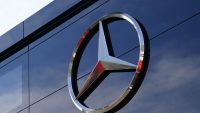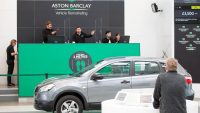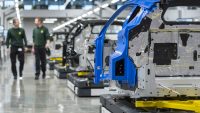Mazda Europe’s CEO Martijn ten Brink has lambasted the European Union’s 2035 ban on internal combustion engined vehicles – describing its implementation as ‘a big mistake’, and ‘a disgrace of the politicians’.
Speaking to Car Dealer at the Brussels Motor Show – not far from the European Commission’s headquarters – ten Brink told us that while Mazda would be ‘ready for any legislation that will be in place’, he found the announced new rules ‘extremely hard to get [his] head around’.
‘I like electric vehicles, I don’t have any problem with that, but what I find a shame is that we seem to have made a choice for the technology, ’ ten Brink told us.
‘Usually, the most innovation comes when you set [someone] a goal, but don’t tell them how to get there.
‘It’s a similar discussion around the USB-C plug in a phone: now that it’s been decided that we all have to have the USB-C plug, essentially that’s the end of creativity around connectivity of the phone.
‘So I have a problem with the fact that they’ve decided how to get there. And that is, only electric.’
While the EU’s new 2035 zero emission target doesn’t appear to explicitly ban individual technologies, its headline figure of a ‘100 per cent reduction in CO2 emissions’ at the exhaust pipe all but rules out any combustion engined cars being sold from then on: even if they’re running synthetic or biofuels.
It seems particularly unclear where hydrogen-powered combustion engines – which Toyota, BMW and Mazda experimented with – sit within the framework, as while they produce no CO2, they’re not free from emissions such as NOx.
For his part, ten Brink thinks the legislation as good as spells the end of development for anything other than battery electric vehicles: a move he decries.
‘I have a problem with the fact that they’ve decided how to get there – and that is, only electric,’ he told us.
‘Mind you, I like electric cars, but you’ve really just discarded everything else – even the stuff you don’t know exists, because you’ve basically said “no”. And I think that is a disgrace of the politicians.
‘That is not their job. Their job is to say: “I want you to have a zero emission future”, but how you get there, that’s where I rely on entrepreneurship and global creativity.’
Ten Brink points to the way other countries are targeting a move away from fossil fuels as having a more nuanced approach – including, perhaps unsurprisingly, Mazda’s homeland of Japan.
He said: ‘The Japanese have also said carbon neutral – but they include certain biofuels, green hydrogen, and they’re also willing to look at things that are new but just might not be there yet.
‘And of course, everybody stops investments in those areas now, because the legislations don’t allow it. And I think it’s a big mistake. So from that point of view, I think zero emissions vehicles in 2035, fine, but that they have to be battery-powered is a bit of a shame.’
Mazda itself has had something of a gentle approach to implementing battery EVs compared to its European rivals. The MX-30 – revealed three years ago – remains its sole zero emission vehicle, and has been criticised for offering a comparatively small range of 124 miles.
The firm’s solution – as revealed by ten Brink at the Brussels show – is a range-extender version, helped along by an 830cc rotary petrol engine.
Any suggestion of Mazda following other manufacturers into an EV-heavy range, meanwhile, will have to wait: ten Brink revealed that a new EV platform is on the way, but not for another two years.
‘We will transition into the electric scaleable architecture in the latter half of 2025,’ said ten Brink, ‘and what I imagine at that stage that we will launch model after model on that scaleable platform.’
Car Dealer Live – the future of the car dealer – exclusive conference features talks from leading car dealers, Google and Auto Trader among much more. Find out the full event details and book tickets.

































